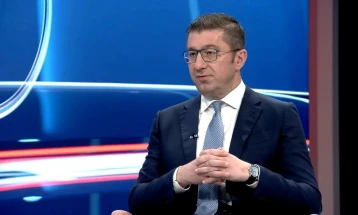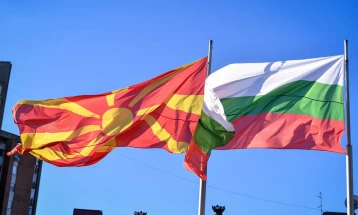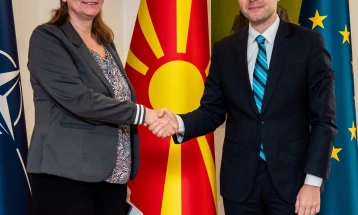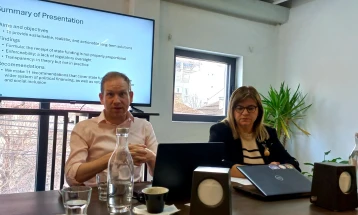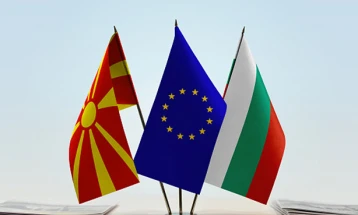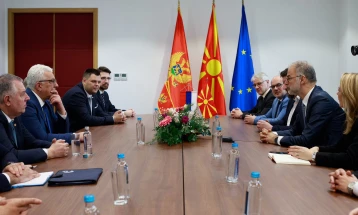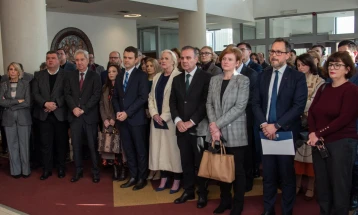North Macedonia and Serbia established ‘historic’ good relations in 2022
- Serbian President Vucic called his country’s relations with North Macedonia as “the best in history” after being impacted by the dynamic of the Open Balkan initiative.
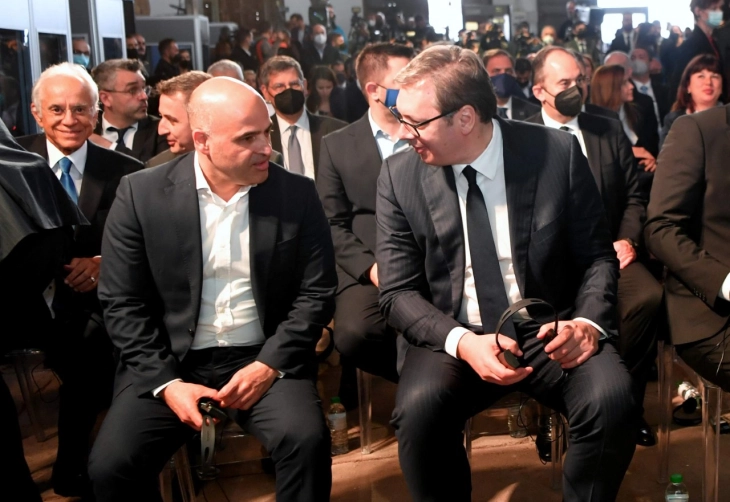
Belgrade, 5 January 2023 (MIA) – What marked 2022 in Serbia were the April general elections, which confirmed the years-long domination of Aleksandar Vucic and his party Serbian Progressive Party (SNS), the formation of the Ana Brnabic-fronted government, the impact of the Russian aggression of Ukraine on Serbia and its refusal to join the EU sanctions, which affected the energy crisis and the EU integration process, as well as the EU-mediated dialogue with Kosovo for normalization of relations, which collapsed by the end of the year with the enigmatic French-German proposal and with Serbia boosting its combat readiness on the border with Kosovo.
Serbian President Vucic called his country’s relations with North Macedonia as “the best in history” after being impacted by the dynamic of the Open Balkan initiative, which includes the signing of several agreements, enhancing of economic cooperation; exports of Serbian milk, flour, food despite Serbia imposing bans for other countries; the closing of the only open issue, namely the recognition by the Serbian Orthodox Church of the Macedonian Orthodox Church – Ohrid Archbishopric; the joint observance of ASNOM at the Prohor Pchinski monastery in Serbia, and establishing of joint cooperation in dealing with the energy crisis.
“Even when we had certain problems, we were close, and today we are the closest we’ve ever been. We no longer have open issues and I’m proud to say we have the best relations in history. I believe we’ll be wise enough to preserve them as such for decades,” Vucic stated at the Open Balkan Summit in Belgrade.
It was Serbian Foreign Minister Nikola Selakovic who first called the relations ‘historic’ at a joint press conference with his Macedonian counterpart Bujar Osmani in February in Skopje.
Serbia’s exports to North Macedonia, he said, stands at a historic level of EUR 815 million and Serbia’s imports of goods from North Macedonia rose by 41.7%, he said. “Our overall trade increased by 30.4% and we’re confident that our trade will continue to grow by further implementing the Open Balkan initiative, seen as a great chance for the region,” Selakovic stated.
The Open Balkan cooperation has continued to boost the economic and political relations between North Macedonia and Serbia at the June summit in Ohrid with the signing of an agreement facilitating the mutual recognition of diplomas, issued by higher education institutions and other authorized institutions in the three Open Balkan countries.
“Today in Ohrid, I want to tell our hosts, our brothers and sisters Macedonians, that Serbia wants nothing from North Macedonia, we only want brotherly and friendly relations. You can always count on us,” Vucic told the Ohrid summit.
As part of the instruments offered by Open Balkan, North Macedonia’s Agriculture Minister Ljupcho Nikolovski and his Serbian counterpart Branislav Nedimovic signed an agreement to lift the ban on export of wheat, corn, flour, cooking oil to North Macedonia.
Another Open Balkan summit followed in Belgrade in September alongside the Wine Vision fair, the first large fair of wine and food including 400 exhibitors from over 22 countries. A record 42 wineries from North Macedonia took part at the event.
At the political segment of the Open Balkan summit, Vucic congratulated North Macedonia and Albania on opening the negotiations to join the EU in July, saying he hoped the Open Balkan initiative will further contribute to economic strengthening “to speak in the region in one voice when it comes to key issues.”
At the leaders’ summit, Prime Minister Dimitar Kovachevski said “today it’s even more clear that North Macedonia, Albania and Serbia with the Open Balkan initiative made the right step at the right time.”
Agreements for mechanisms providing food in the Western Balkans, a memorandum of understanding and cooperation in cinema and audiovisual activities as well as an operational civil protection plan were signed at the forum.
During the many bilateral meetings, Deputy PM for European Affairs Bojan Marichikj announced the signing of a cooperation memo with Serbia, and the culture ministries of North Macedonia and Serbia signed cooperation programs 2022-2025. Also, Economy Minister Kreshnik Bekteshi and Energy Minister Zorana Mihajlovic discussed energy cooperation and energy security and Transport Minister Blagoj Bochvarski with his Serbian counterpart Tomislav Momirovic discussed joint infrastructural projects for e-toll payment in Open Balkan countries.
At a news conference after the summit, the leaders of Serbia, North Macedonia and Albania warned that “a difficult winter is ahead, but we’d signed agreements to tackle it together.” Such efforts began in May in Greece’s Alexandroupolis at the start of construction works of a liquid gas terminal. There, Vucic noted that Serbia should construct a gas network with North Macedonia all the while calling the construction of the LNG terminal ‘an important event for the whole of the Balkans.’
In October, during a tour of the works for construction of a Nis – Dimitrovgrad gas interconnector alongside European Commission President Ursula von der Leyen, the Serbian President that revealed that the gas interconnection with North Macedonia will cost over EUR 70 million.
In November, PM Kovachevski and President Vucic in Belgrade confirmed that their countries are coming closer to a solution over the possibility for using Serbia’s natural gas surplus for the TeTo gas power plant that produces electricity.
In addition to gas connection, 2022 saw the start of talks about the construction by Serbia of an oil pipeline to North Macedonia and Albania’s Durres port.
Another infrastructure incentive in 2022 was the announcement of the reconstruction of the 92-km Nis-Preshevo-North Macedonia rail for speed trains as part of the project for modernization of the Belgrade-Nis-Preshevo corridor.
2022 will enter the history books also because the only open issue, namely the church issue involving the recognition of the Macedonian Orthodox Church (MPC-OA) by the Serbian Orthodox Church (SPC), was closed.
SPC’s synod in early May in Belgrade held a session making an unanimous decision to recognize MPC’s autocephaly. As a result, Serbian Patriarch Porfirije and the Archbishop of Ohrid and Macedonia, Stefan, held a so called reconciliation liturgy.
On June 5, Patriarch Porfirije handed over to HH Stefan an act confirming the SPC’s decision to bless MPC’s autocephaly, thus ending the 55-year dispute between the two churches.
This historic step between the two churches and nations bore fruit. Namely, after an 18-year hiatus, North Macedonia was allowed to mark Ilinden, Uprising Day, at the St. Prohor Pchinski monastery in Serbia after a blessing was given by Patriarch Irinej and support by President Vucic. Serbia’s state and church delegation at the Prohor Pchinski observance was led by Foreign Minister Nikola Selakovic.
“This is the place where the modern Macedonian state was formed. There had been several reasons why we couldn’t come here, to this place, to celebrate the holiday. We had to organize alternative events nearby, but couldn’t organize anything here [Prohor Pchinski], where the historical ASNOM session took place,” President Stevo Pendarovski told the event.
I hope, he noted, that this is the beginning of a good tradition to mark August 2, our second Ilinden, here, to pay respects to those who had formed the Macedonian state in 1944.
Serbia and North Macedonia in 2023 are expected to upgrade their historically solid relations by finally opening cultural centers in Belgrade and Serbia and by opening a Macedonian language lectorate in Belgrade after a 30-year hiatus.
Oliver Brankovic
Translated by Bisera Altiparmakova
